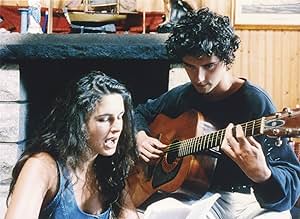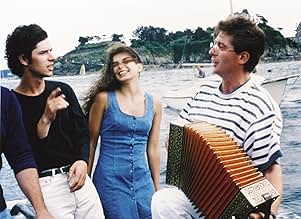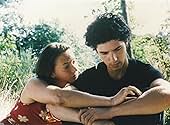As a reserved young graduate vacations in a seaside town, he hopes his girlfriend will join him. But he ends up bonding with a local young woman whose female friend is also smitten with him.As a reserved young graduate vacations in a seaside town, he hopes his girlfriend will join him. But he ends up bonding with a local young woman whose female friend is also smitten with him.As a reserved young graduate vacations in a seaside town, he hopes his girlfriend will join him. But he ends up bonding with a local young woman whose female friend is also smitten with him.
- Awards
- 2 nominations total
- Director
- Writer
- All cast & crew
- Production, box office & more at IMDbPro
7.611.6K
1
2
3
4
5
6
7
8
9
10
Featured reviews
Pure Life if right
I couldn't agree more with the previous commenter from Germany in that we are so accustomed to dialogue and plot coming from Hollywood that when something this thoughtful and pure comes along, it just blows us away. I love the way Rohmer slowly guides the audience into the film, without a need for narration, only the sights and sounds of Brittany. When the first words of dialogue begin, it is so natural, but says so much about the characters. "I don't want to plan my life around money", Gaspard tells Margot, and you see him go through a process of writing his sea shantey, a really great little piece of music if you ask me. And to see a five minutes scene with Gaspard and Solene actually singing the song was just riveting. How does rohmer make something so banal on the surface so climactic? On paper, his stories and his characters don't really seem that interesting, but he adds something to them that make them resonate so deeply in me, and I am almost awestruck when it happens.
The great thing is that I can say that for almost all of Rohmer's films, especially those that make up the "Tales of the Four Seasons" I can't say I have a favorite because things like favorite or top films just go against the grain of what Rohmer is doing. I read somewhere that Rohmer has never made a masterpiece, in fact, he's never even attempted to. and yet, each character he's given us, Jeanne, Natascha and Igor from Spring, Gaspard and Margot from Summer, Isabelle, Magali, Gerard and Rosine from Autumn, and Felicie and Charles from Winter, are drawn so vividly that I sometimes forget that they are only characters and not people I call as personal friends.
In addition, I'd like to add that Amanda Langlet's characters seem to be the only "pure" characters in any of Rohmer's films, both as Pauline and Margot, She is beautiful, kind, intelligent, honest.....whereas his other characters, though likable and sympathetic, all have certain flaws.., some tell lies, some are neurotic, some judgemental, deceitful..self-indulgent, capricious.., so forth.
The great thing is that I can say that for almost all of Rohmer's films, especially those that make up the "Tales of the Four Seasons" I can't say I have a favorite because things like favorite or top films just go against the grain of what Rohmer is doing. I read somewhere that Rohmer has never made a masterpiece, in fact, he's never even attempted to. and yet, each character he's given us, Jeanne, Natascha and Igor from Spring, Gaspard and Margot from Summer, Isabelle, Magali, Gerard and Rosine from Autumn, and Felicie and Charles from Winter, are drawn so vividly that I sometimes forget that they are only characters and not people I call as personal friends.
In addition, I'd like to add that Amanda Langlet's characters seem to be the only "pure" characters in any of Rohmer's films, both as Pauline and Margot, She is beautiful, kind, intelligent, honest.....whereas his other characters, though likable and sympathetic, all have certain flaws.., some tell lies, some are neurotic, some judgemental, deceitful..self-indulgent, capricious.., so forth.
A fortnight by the sea in charming company.
Gaspard, played by Melvil Poupaud, is a song writer, a good-looking but
dull young man, a gauche loner with a flat voice and an inexpressive
face who comes to this delightful holiday island of Dinard off the
Brittany coast to await the arrival of his `sort-of' girl friend, who
demonstrates how much she loves him by keeping him waiting for two
weeks. During those two weeks, however, he finds two other girl friends
anything else. First he is picked up in a restaurant by Margot, a
waitress, who turns out not to be a waitress but an Ethnologist, just
helping out her aunt who owns the restaurant. Obviously such a bright
and intelligent girl could not be merely working-class!
Amanda Langlet, who plays Margot and who appeared ten years earlier in
Rohmer's `Pauline at the Beach.' is clearly the star of this film. Much
of the enjoyment of the film is derived from being in the company of
this vivacious girl and being allowed to eavesdrop on her talk with
Gaspard about love and relationships as they roam in the bright sunlight
around this lovely French sea-side resort and the countryside beyond.
She is such a very warm and sympathetic listener that it is difficult to
understand why he doesn't fall in love with her. Why she doesn't fall in
love with him is easier to understand. (you ask yourself; is this man a
very good actor or a very bad one?) He makes a couple of inept attempts
to move the relationship forward but is repulsed; she wants only
friendship - and you feel he is lucky to get that - while she awaits the
return of her Anthropologist boy-friend who is away in South America.
Gaspard's dullness is made obvious when she takes him to hear an old
sailor sing sea-shanties; her face so eager and enrapt as she listens
intently; his face, alongside, so lifeless.
She encourages him to take up with Solene, played by Gwenaelle Simon in
her first film, a friend of her's who they meet at a dance, but when he
does, she is jealous, jealous of their friendship she says but secretly
hurt that he now thinks of her as only a friend.
His relationship with Solene seems idyllic at first, they seem
marvelously happy and well suited to each other. He is accepted warmly
into her family, they all go sailing together and have a merry
sing-a-long to one of his songs. But then, sadly, her true nature shows;
she becomes aggressive and demanding, insisting that he take her to the
island of Quessant or their relationship is at an end. And now Lena, his
`sort-of' girl friend, played by Aurelia Nolin, appears and insists that
he take her instead. He must now choose.
Rohmer's films are never plot-dependent; he prefers to dwell on the
characters, to bring us into a close, intimate relation with them, while
they reveal themselves in talk. And when the characters are as
attractive as Margot
dull young man, a gauche loner with a flat voice and an inexpressive
face who comes to this delightful holiday island of Dinard off the
Brittany coast to await the arrival of his `sort-of' girl friend, who
demonstrates how much she loves him by keeping him waiting for two
weeks. During those two weeks, however, he finds two other girl friends
- or rather they find him. It must be his good-looks, it can't be
anything else. First he is picked up in a restaurant by Margot, a
waitress, who turns out not to be a waitress but an Ethnologist, just
helping out her aunt who owns the restaurant. Obviously such a bright
and intelligent girl could not be merely working-class!
Amanda Langlet, who plays Margot and who appeared ten years earlier in
Rohmer's `Pauline at the Beach.' is clearly the star of this film. Much
of the enjoyment of the film is derived from being in the company of
this vivacious girl and being allowed to eavesdrop on her talk with
Gaspard about love and relationships as they roam in the bright sunlight
around this lovely French sea-side resort and the countryside beyond.
She is such a very warm and sympathetic listener that it is difficult to
understand why he doesn't fall in love with her. Why she doesn't fall in
love with him is easier to understand. (you ask yourself; is this man a
very good actor or a very bad one?) He makes a couple of inept attempts
to move the relationship forward but is repulsed; she wants only
friendship - and you feel he is lucky to get that - while she awaits the
return of her Anthropologist boy-friend who is away in South America.
Gaspard's dullness is made obvious when she takes him to hear an old
sailor sing sea-shanties; her face so eager and enrapt as she listens
intently; his face, alongside, so lifeless.
She encourages him to take up with Solene, played by Gwenaelle Simon in
her first film, a friend of her's who they meet at a dance, but when he
does, she is jealous, jealous of their friendship she says but secretly
hurt that he now thinks of her as only a friend.
His relationship with Solene seems idyllic at first, they seem
marvelously happy and well suited to each other. He is accepted warmly
into her family, they all go sailing together and have a merry
sing-a-long to one of his songs. But then, sadly, her true nature shows;
she becomes aggressive and demanding, insisting that he take her to the
island of Quessant or their relationship is at an end. And now Lena, his
`sort-of' girl friend, played by Aurelia Nolin, appears and insists that
he take her instead. He must now choose.
Rohmer's films are never plot-dependent; he prefers to dwell on the
characters, to bring us into a close, intimate relation with them, while
they reveal themselves in talk. And when the characters are as
attractive as Margot
It's like eavesdropping on real life characters!
Rarely do we see such perfection in the direction of a film. Erich Rohmer gets all the details right - every movement, every gesture, all the uncertainties of growing up and falling in and out of love. I can see no flaws. I have to ask myself: Am I watching a group of actors? I seem to be watching a slice of real life with real people trying to cope with life's romantic problems. There's very little to the story. Gaspard, a young mathematics graduate comes to a beautiful island beach resort in Brittany, there to meet up with his girl friend Leon. When she doesn't turn up at the appointed time, he spends his days with two girls he meets on the island. The format of the film is much like a personal diary with the day to day events moving the story to its inevitable conclusion. Each of the three girls interrogate Gaspard about his attitudes to love, friendship and women in general. One feels that the indecisive Gaspard is more at home with his maths. and his guitar than with women. The strength of the film lies in the natural dialogue. It seems so familiar to us as we have all encountered similar experiences and thoughts in our youth. Eric Rohmer has a keen eye as he reveals all the hopes and disappointments of people searching for love. The photographer captures the idyllic beauty of this lovely resort, so bright and sunny. You can almost smell the sea air! It's a very gentle film and handled with a delicate touch, but one wonders in the end whether it may have been a little more enjoyable if a little more excitement could have been injected into the story.
Perhaps the best of Rohmer's seasons films
One of Rohmer's best. Gaspard (Melvil Poupaud) takes a month long vacation to a beach in Normandy, waiting for his more or less official girlfriend, the somewhat snotty Lena (Aurelia Nolin), to come. While waiting for her, he befriends the waitress and aspiring anthropologist Margot (Rohmer regular Amanda Langlet). Eventually, a relationship between the two develops, which seems to consists almost exclusively of long talks in the beach. But this is not all, since he soon also meets the somewhat promiscuous (but "principled") Solene (Gwaenelle Simon) in a disco. When Lena finally arrives to the resort, more than halfway into the movie, he finally finds himself in the position of having to choose one of the three. Rohmer would want us to think that Margot would be the best choice, and is difficult to disagree, since she's so charming and so willing to listen to him and even put up with him. It's amazing how Rohmer (who was in his late 70s when he directed this) is able to portray realistically how young people talk and interact. The final decision by Gaspard was a bit of a disappointment, but it was probably the more realistic possibility.
Rhomer's poem about indecision in love set in Summer
It often goes unstressed how difficult it is to craft a simple, crisp and minimal output as opposed to something complicated. Rhomer deceives you with the simplicity of the visual framework he uses and lets you into this intricate world of human relationships. I wouldn't go into the characters and story (Already in the description). The story is set in Brittany region and specifically the town of Dinard. Like in any Rohmer film, you see abundance of natural ambience and lack of any music. The central character is a musician and a confused lover, who goes through a series of situations that would help him in a way rediscover himself. The most interesting character is Margot (Amanda Langlet) but I also found the presence of Solène( Gwenaëlle Simon) mesmerizing. These two characters somewhat set the two extremes where Gaspard (Melvil Poupaud) travels to and fro, throughout the film while being anchored to a third woman, Lèna. Each scene dwells deep into these three women characters and their relationships with Gaspard with their subtle gestures and deeply felt emotions. If you look closely at these characters you can see a lot more going on than the words they exchange. In many ways, Rohmer is a lot like Yasujiro Ozu, who also tells complex human stories with his trademark minimalism. I would highly recommend this to anyone who appreciates poetic, visually stunning films on human relationships. You needn't be a romantic for it. A definite 8/10 from me.
Did you know
- TriviaThis is, perhaps, the film in which Rohmer - notoriously silent about his private life - came closest to autobiography, filling the story with discrete traces and allusions to his own past. "Of all the films I've made, I think this is the most personal vehicle. Everything that is in this film is true. They are either things that I experienced in my youth or things that I noticed. [...] I have carried with me the story of this film, which was in part inspired by events that occurred during my adolescence, for a long time."
- Antoine de Baecque & Noël Herpe, "Éric Rohmer: A Biography" (New York: Columbia University Press, 2016), p. 458.
- ConnectionsFeatured in The Movie Show: Episode dated 16 April 1997 (1997)
- SoundtracksFille de corsaire
Performed by Sebastien Erms
- How long is A Summer's Tale?Powered by Alexa
Details
- Release date
- Country of origin
- Language
- Also known as
- Chuyện Mùa Hạ
- Filming locations
- Rue de la Malouine, Dinard, Ille-et-Vilaine, France(Solene's cousins house)
- Production companies
- See more company credits at IMDbPro
Box office
- Gross US & Canada
- $198,126
- Opening weekend US & Canada
- $12,863
- Jun 22, 2014
- Gross worldwide
- $198,706
- Runtime
- 1h 53m(113 min)
- Color
- Sound mix
Contribute to this page
Suggest an edit or add missing content


























